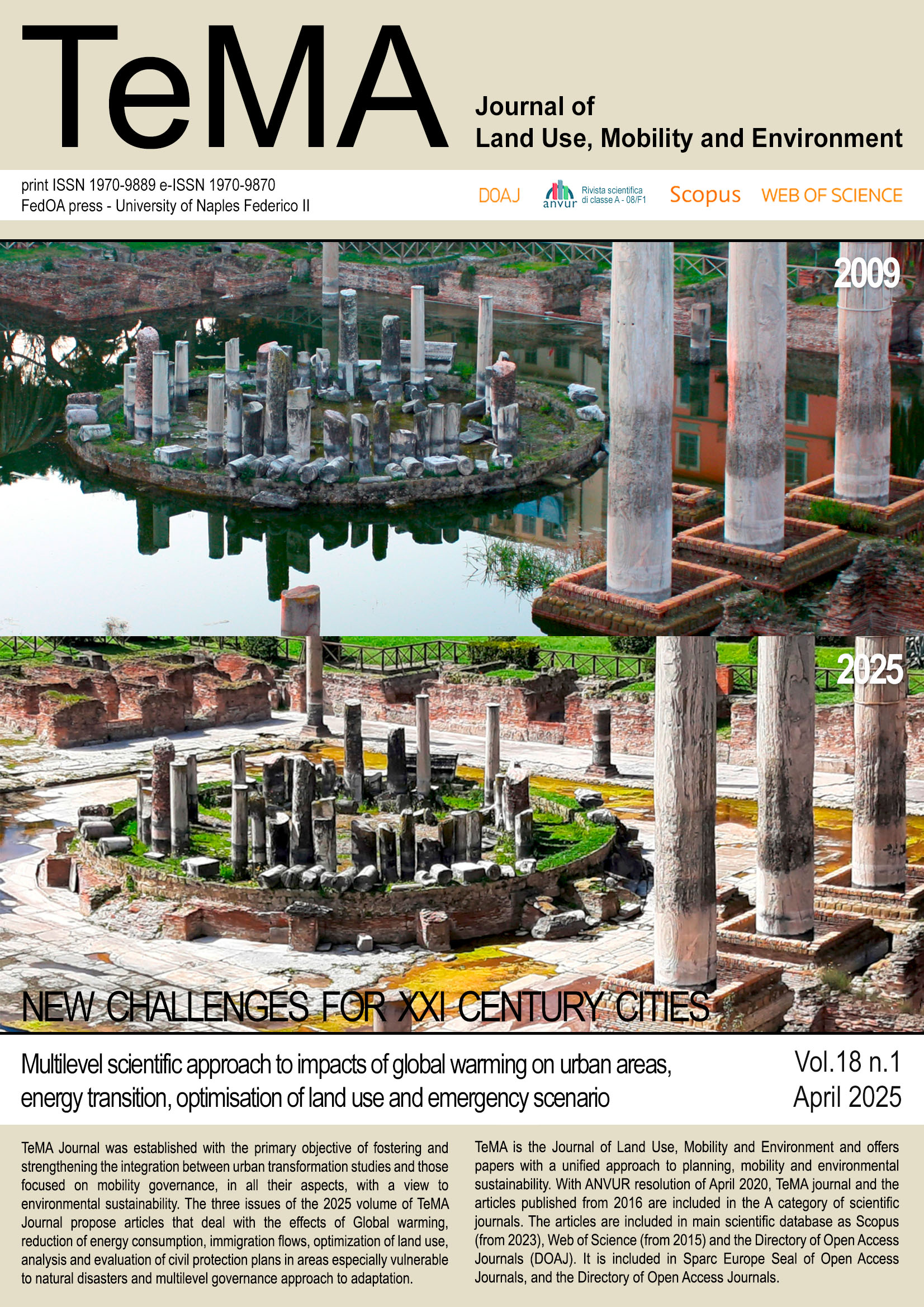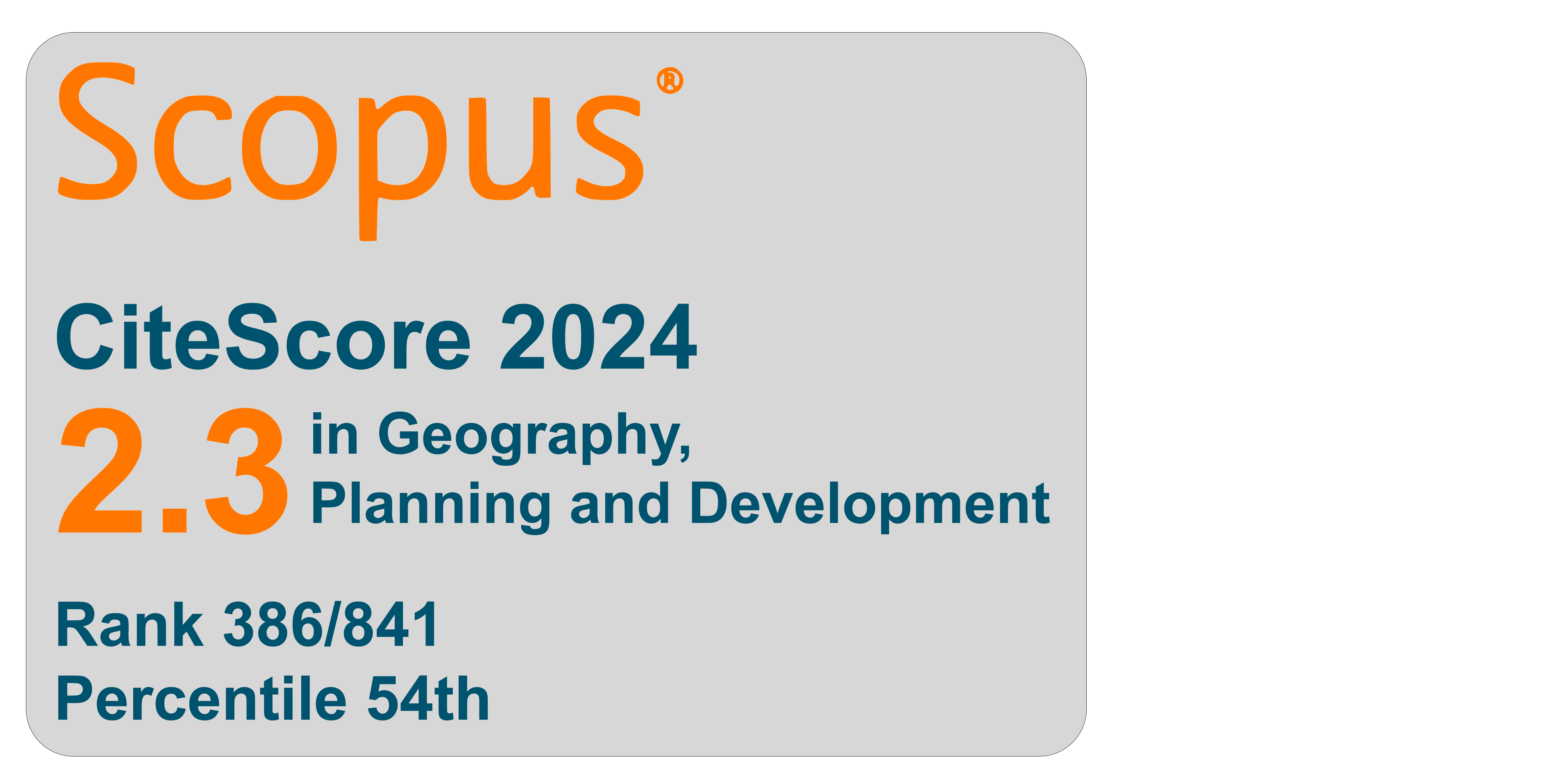Competitive climate adaptation. Italian startups leading the way to climate change adaptation in cities
DOI:
https://doi.org/10.6093/1970-9870/11654Keywords:
Climate change, Adaptation, Urban practices, Competitiveness, Climate startupsAbstract
Starting from the relationship between urban planning and mobility management, TeMA has gradually expanded the view of the covered topics, always remaining in the groove of rigorous scientific in-depth analysis. This section of the Journal, Review Notes, is the expression of continuously updating emerging topics concerning relationships between urban planning, mobility and environment, through a collection of short scientific papers written by young researchers. The Review Notes are made of five parts. Each section examines a specific aspect of the broader information storage within the main interests of TeMA Journal. In particular, the Urban Practices section aims at presenting recent advancements on relevant topics that underline the challenges that the cities have to face.
This note provides an overview of the role that innovative climate startups can play in fostering climate adaptation in cities while promoting urban competitiveness, and the strategic support that these entities can provide in managing urban and territorial transformations. The nature of these entities and the role they can play in the governance of urban transformation is outlined, and a brief review of Italian cases is carried out. Finally, the results are discussed, highlighting the potential that these economic constructions have in urban climate adaptation and urban competitiveness, but also the challenges they face. Three significant case studies of startups promoting climate adaptation in urban areas are presented, showing the relevance of the topic and its potential role in the urban adaptation discussion.
Downloads
References
Agricoltura sostenibile in Italia: scopri il progetto | ZeroCO2. (2024). zeroCO2. Retrieved from: https://zeroco2.eco/it/progetti/supporto-alle-cooperative-agricole-sociali-in-italia/
Baber, L. (2024). State of Climate Tech 2024. PwC. https://www.pwc.com/gx/en/issues/esg/climate-tech-investment-adaptation-ai.html
Blank, S. & Dorf, B. (2020). The startup Owner’s manual: The Step-By-Step Guide for Building a Great Company. John Wiley & Sons.
Buratti, C. (2024). Quanto si investe in startup di climate tech in Italia? StartupItalia. https://startupitalia.eu/economy/quanto-si-investe-in-startup-di-climate-tech-in-italia/
Climate Policy Initiative (CPI). (2024). Global Landscape of Climate Finance 2024: Insights for COP 29. Retrieved from: climatepolicyinitiative.org/publication/global-landscape-of-climate-finance-2024
IPCC (2021). Climate change 2021: The physical science basis. In V. Masson-Delmotte et al. (Eds.), Sixth Assessment Report of the Intergovernmental Panel on Climate Change. Cambridge University Press. https://doi.org/10.1017/9781009157896
IPCC. (2022). Climate change 2022: Impacts, adaptation and vulnerability. In H.-O. Pörtner et al. (Eds.), Sixth Assessment Report of the Intergovernmental Panel on Climate Change. Cambridge University Press. Retrieved from: https://www.ipcc.ch/report/ar6/wg2/
Koirala, S. (2019), “SMEs: Key drivers of green and inclusive growth”, OECD Green Growth Papers, No. 2019/03, OECD Publishing, Paris, https://doi.org/10.1787/8a51fc0c-en.
Latitudo 40. (n.d.). Empower Sustainable Growth with AI-Driven Satellite Insights. Latitudo 40. Retrieved from: https://www.latitudo40.com/
Latitudo40. (n.d.). Urban evolution - Use cases. Retrieved from: https://www.latitudo40.com/uses-cases/urban-evolution
Lenton, T. M., Rockström, J., Gaffney, O., Rahmstorf, S., Richardson, K., Steffen, W. & Schellnhuber, H. J. (2019). Climate tipping points — too risky to bet against. Nature, 575(7784), 592–595. https://doi.org/10.1038/d41586-019-03595-0
Massa, L. & Cuppoloni, F. (2023). State of Italian Climate Tech Startups. Medium. Retrieved from: https://medium.com/%40italianclimatetech/state-of-italian-climate-tech-d3ca23fccdfb
OECD (2023), Scaling Up the Mobilisation of Private Finance for Climate Action in Developing Countries: Challenges and Opportunities for International Providers. OECD Publishing. https://doi.org/10.1787/17a88681-en.
SaferPlaces. (2024). SaferPlaces helps the metropolitan city of Venice to fight pluvial flooding. SaferPlaces. https://saferplaces.co/saferplaces-helping-the-metropolitan-city-of-venice-to-fight-pluvial-flooding/
SaferPlaces (2025). SaferPlaces Global Platform — AI-based digital twin solution for flood risk intelligence. Retrieved from: https://saferplaces.co/
Sgambati, S., & Gargiulo, C. (2022). The evolution of urban competitiveness studies over the past 30 years. A bibliometric analysis. Cities, 128, 103811. https://doi.org/10.1016/j.cities.2022.103811
United Nations Environment Programme (UNEP) (2023). Adaptation Gap Report 2023: Underfinanced. Underprepared. Inadequate investment and planning on climate adaptation leaves world exposed. UNEP. https://doi.org/10.59117/20.500.11822/43796
zeroCO2 (2024). zeroCO2 - Progetti sostenibili e ambientali per aziende & privati. Retrieved from: https://zeroco2.eco/it/
Downloads
Published
How to Cite
Issue
Section
License
Copyright (c) 2025 Stella Pennino

This work is licensed under a Creative Commons Attribution-NonCommercial 4.0 International License.



